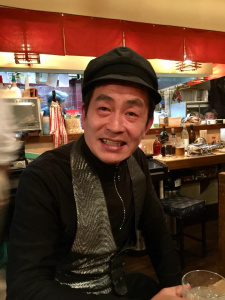Hideki Kanazashi
| Hideki Kanazashi | ||||||||||||
 |
||||||||||||
| ||||||||||||
Hideki Kanazashi is a Japanese former music composer known for his work with HAL Laboratory. He started working for HAL around 1984 and left around 1990. He is perhaps best known for composing the music for the Adventures of Lolo series (in which he also contributed game design). He also is known for composing the music to the game Mach Rider, as well as Rollerball, Uchuu Keibitai SDF, and Famicom Grand Prix II: 3D Hot Rally. Most of Kanazashi's work was done on the NES, but he also did a few games for the Game Boy, as well as the MSX. Kanazashi is known for his complex musical style, consisting of odd time signatures, and combining the limited sound channels into a chord. In all of the games he worked on, he worked with HAL's main sound programmer Hiroaki Suga.
Hideki continues to play piano.
Audio Development
Most of the music he composed was jazz but he also composed rock and Latin tunes as well. Most of the music he composed consisted of notes coming together as chords making the music much more enjoyable to listen to. Hideki's most notable works are probably the Adventures of Lolo games on NES. Hideki's musical style sounds similar to David Wise.
Kanazashi also occasionally wrote in odd time signatures. A couple examples include Air Fortress Interior from Air Fortress (7/4) and Opening from Famicom Grand Prix: 3D Hot Rally (9/8). Another example is Yama from Shanghai (GB) (5/8). While the later HAL composer Jun Ishikawa is known for the same thing (dubbed the Ishikawa-bushi by fans), he most likely picked this up from Kanazashi, as the two had worked together.
FDS/NES
According to Hideki, he started out handing his compositions to the programmers, who would implement his music into the game (most likely by Hiroaki Suga). Later, due to the criticism from other employees about his work, they created Music Maker around the Famicom Disk System era, so he could create music easier. In the program, the user would input music in a custom Music Macro Language. First, the note pitch, followed by the length. The program most likely ran on an MSX computer.
Gameography
| Released | Title | Sample | Notes |
|---|---|---|---|
| 1984-11-02 | F1 Race (FC) (F1 レース) | |
|
| 1985-??-?? | Eggerland Mystery (MSX) (エッガーランドミステリー) | ||
| 1985-??-?? | Mach Rider (VS) | |
|
| 1985-10-18 | Mach Rider (NES) (マッハライダー) | |
|
| 1986-??-?? | Eggerland 2 (MSX2) (迷宮神話) | |
|
| 1986-??-?? | Gall Force: Defence of Chaos (MSX) | Composer? | |
| 1986-04-25 | Keisan Game: Sansuu 1 Nen (FC) (けいさんゲーム さんすう1年) | ||
| 1986-04-25 | Keisan Game: Sansuu 2 Nen (FC) (けいさんゲーム さんすう2年) | ||
| 1986-04-25 | Keisan Game: Sansuu 3 Nen (FC) (けいさんゲーム さんすう3年) | ||
| 1986-10-13 | Othello (FDS) (オセロ) | |
|
| 1986-10-30 | Keisan Game: Sansuu 4 Nen (FC) (けいさんゲーム さんすう4年) | ||
| 1986-10-30 | Keisan Game: Sansuu 5+6 Nen (FC) (けいさんゲーム さんすう5+6年) | ||
| 1986-11-13 | Othello (NES) | |
|
| 1986-12-10 | Gall Force: Eternal Story (FDS) (ガルフォース ETERNAL STORY) | |
|
| 1987-01-89 | Eggerland (FDS) (エッガーランド) | |
|
| 1987-08-17 | Air Fortress (NES) (エアー・フォートレス 空中要塞) | |
|
| 1988-01-07 | Satsui no Kaisou: Power Soft Satsujin Jiken (FC) (殺意の改装 殺人事件) | Music Data Arrangement (Arranged Tohru Inoue's music.) | |
| 1988-02-01 | Fire Bam (FDS) (ファイヤー バム) | |
|
| 1988-02-01 | Jumbo Ozaki no Hole in One Professional (FC) (ジャンボ尾崎のホールインワンプロフェッショナル) | With Hiroaki Suga. (Composed all music?) | |
| 1988-04-14 | Famicom Grand Prix II: 3D Hot Rally (FDS) (ファミコングランプリⅡ ホットラリー) | |
All songs except Monster Dance by Soyo Oka. Arranger of Monster Dance? |
| 1988-08-09 | Eggerland: Meikyuu no Fukkatsu (FC) (エッガーランド 迷宮の復活) | |
|
| 1988-08-20 | Eggerland: Journey to the Creation (FDS) (エッガーランド 創造への旅立ち) | |
Uses music from previous Eggerland games. |
| 1988-12-20 | Rollerball (NES) (ローラーボール) | With Hiroaki Suga. | |
| 1989-04-?? | Adventures of Lolo (NES) | |
Uses music from previous Eggerland games. |
| 1989-07-28 | Shanghai (GB) (上海) | |
With Hiroaki Suga. |
| 1989-10-18 | Revenge of the 'Gator (GB) (ピンボール66匹のワニ大行進) | Verified by composer. | |
| 1989-11-17 | Gozonji Yajikita Chin Douchuu (FC) (御存知 弥次喜多珍道中) | Music Tone with Hiroaki Suga. (Arranged the music of Tohru Inoue, Shigeharu Isoda, and Kenichiro Isoda.) | |
| 1990-01-06 | Adventures of Lolo 2 (NES) (アドベンチャーズ オブ ロロ) | Uses music from previous Eggerland games. | |
| 1990-12-26 | Adventures of Lolo 3 (NES) (ADVENTURES OF LOLO Ⅱ) | ||
| 1990-09-07 | Uchuu Keibitai SDF (FC) (宇宙 警備隊 SDF) | With Jun Ishikawa. | |
| 1990-??-?? | Othello (GB) (オセロ) | Uses music from Othello (NES). | |
| 1991-02-23 | HAL's Hole in One Golf (SNES) (ジャンボ尾崎の ホールインワン) | Uses jingles from Jumbo Ozaki no Hole in One Professional (FC). Arranged by Jun Ishikawa. | |
| 1994-09-30 | Othello World (GB) (オセロワールド) | Uses music from Othello (NES). | |
| Unreleased | Air Fortress (FDS) (空中要塞) | |
Aliases
Hideki used many aliases in his career. Some of the aliases he used included the words Rodeo, Nigeta, and Zap. Some games also credit his surname as Kanagushi. Nigeta means "to run away", and he has also gone by the alias Escaper Kanagushi. It is unknown what the etymology of this alias is. However, Japanese Twitter user @camelletgo explained its possible origins:
Image Gallery
Links
- facebook.com/profile.php?id=100014032570710 - Facebook.
- w.atwiki.jp/gamemusicbest100/pages/7004.html - Atwiki (Japanese).





